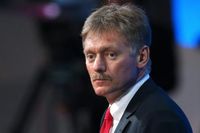In a significant diplomatic development, a new round of negotiations between Ukraine and the United States took place in Riyadh, Saudi Arabia, aimed at discussing a potential ceasefire with Russia. According to reports from AFP, the talks involved delegations from both countries fully engaging in discussions about halting the ongoing conflict. The meetings are being closely observed due to the pivotal nature of the ceasefire talks amid ongoing tensions in the region.
During these negotiations, which reportedly began on March 23, 2025, Ukrainian Defense Minister Rustem Umerov noted that the conversation was constructive and meaningful. An official from the Office of the President, Serhiy Leshchenko, revealed that the delegations deliberated on crucial issues, including the need to stop shelling Ukrainian ports and infrastructure in Odesa, Mykolaiv, and Kherson regions. This focus indicates an earnest push from Ukraine to stabilize its infrastructure amidst the conflict.
Moreover, details reported by Bloomberg highlighted that one of the major topics of discussion was the Black Sea initiative, which aims to ensure safety and security in maritime operations in the region. Both sides are grappling with a series of complex issues, making the negotiations critical not just for Ukraine but for broader regional stability.
In tandem with these discussions, U.S. President Donald Trump’s administration announced optimism regarding the potential outcomes of the diplomatic talks. A source from Washington stated, "The negotiations are going very well, and we expect a positive statement soon." This sentiment is reflective of a broader strategy employed by U.S. officials, who have sought to maintain a tone of hopefulness despite the lack of concrete results emerging from the recent engagements.
Grigory Karasin, head of the international committee of the Federation Council in Russia, also provided insights, confirming the convoluted nature of the negotiations. He recounted that the parties faced difficulties, yet he asserted that many important issues were brought to the table. The involvement of various stakeholders illustrates the complex web of international relations woven around this conflict.
The negotiations took place within a backdrop of increasing pressure for a cessation of hostilities, which has not only affected local civilians but also had far-reaching impacts on international political dynamics. With ongoing military activities, any measures leading to a truce could alter the geopolitical landscape significantly.
In Washington, the discussions have become a focal point for political analysis, and despite challenges in direct communications, there is a consistent push for continuing these diplomatic efforts. Observers note that through these negotiations, while indirect, both parties may be able to clarify miscommunications and work towards a path of de-escalation.
Furthermore, Ukrainian President Volodymyr Zelensky has made it clear that Ukraine is prepared to support any robust initiative aimed at compelling Russia to conclude hostilities. This includes emphasizing sanctions and enhanced international support for Ukraine, which plays a crucial role in shaping the diplomatic narrative surrounding the conflict.
Despite continuing hostilities, U.S. officials remain hopeful that these rounds of talks can foster a change in the current trajectory of the conflict. Acknowledging the actual circumstances, they maintain a belief that ongoing discussions may yield benefits that have been elusive thus far.
As the second round of this negotiation concluded punctually at 12:00 on March 24, 2025, the next steps remain uncertain. The results of these meetings are expected to travel back to Moscow for evaluation soon, with an anticipation that further statements regarding the outcomes will emerge shortly. The era of engaging through intermediaries is drawing attention to the importance of dialogue in non-direct interactions.
This evolving situation reflects the intricate dance of diplomacy where hope and reality often collide. The impact on citizens caught within this conflict, as well as the broader implications for international relations, rest heavily on the results of these ongoing negotiations. For those following the developments closely, this moment signifies a critical juncture that could lead either to continued discord or a path toward stability.







